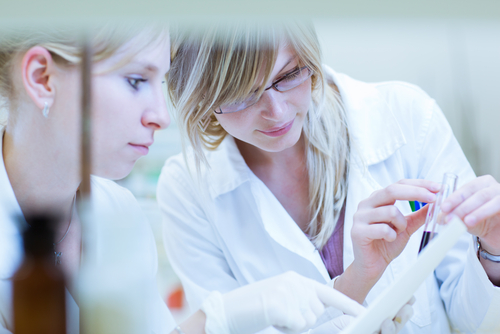Researchers from the Laboratory of Molecular Genetics and Immunology of The Rockefeller University in New York identified that anti-cancer antibodies can generate immunological memory and fight tumors. Their results were published May 11, 2015 in the journal Cell with the title “Differential Fc-Receptor Engagement Drives an Anti-tumor Vaccinal Effect.”
As immune proteins that can specifically recognize and kill cancer cells, antibodies have been used as an anti-tumor therapy for about two decades. It was known that while the two arms of these antibodies target the cancer cell, the other part of the molecule binds to Fc receptors present on immune cells.
This new study reveals how the immune system generates memory, in case it encounters the same tumor. Study senior author Dr. Jeffrey Ravetch and first author Dr. David Dilillo started by establishing a mouse model of anti-tumor vaccinal effect by passive anti-tumor antibody treatment. They injected lymphoma cells that expressed the tumoral protein or antigen CD20 into mice genetically engineered to contain human Fc receptors.
The researchers then treated the same mice with antibodies able to recognize CD20. All mice survived the lymphoma and continued to show resistance when challenged with the same lymphoma even three months later. Although they knew Fc receptors were involved in the initial attack on tumors, the authors specifically wanted to identify the immune cells carrying Fc receptors responsible for memory formation.
“Our experiments using lymphoma, a type of blood cell cancer, uncovered a two-step process that revolves around two receptors found on different types of immune cells, linking those cells to antibodies. In this way, these so-called Fc receptors act as crucial intermediaries,” said Dr. Ravetch in a press release.
Using different approaches the team identified two types of Fc receptors involved in the process: FcRIIIA on immune cells known as macrophages, which destroy the antibody-laden tumor cell, and FcRIIA, on dendritic cells, which upon antibody plus antigen binding, activate the cells responsible for generating memory, T cells.
This study can enable the future design of more efficient antibodies to develop anti-tumoral memory. “By engineering the antibodies so as to increase their affinity for both FcRIIIA and FcRIIA, we were able to optimize both steps in this process,” Dr. DiLillo said.
“Current antibody therapies are only engineered to improve the immediate killing of tumor cells, but not the formation of immunological memory. We are proposing that an ideal antibody therapy would be engineered to take full advantage of both steps,” added Dr. Ravetch.


